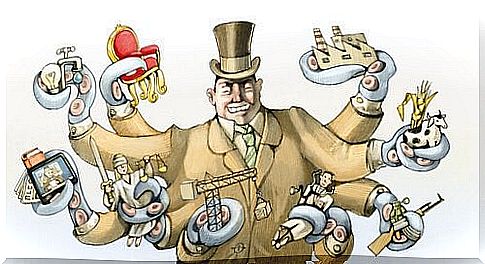From Selfishness To Self-love According To Aristotle

Aristotle once said, “he wondered if a man should love himself most or if it is better to love others.” This wise Greek philosopher postulated a unique vision of selfishness and the intimate relationship with self-love. What do you say to finding out a little more about this inference?
Before we move on, we should point out that we will focus on his famous work The Nicomachean Ethics . To be more specific, we will go directly to Chapter VIII of his ninth book, entitled “Concerning Selfishness or Self-Love.”
Love for oneself or self-love according to Aristotle
In this chapter of Aristotle’s detailed work, the philosopher breaks down what he considers a worthy man to be. In his work, the author focuses on the comparison between love for oneself and selfishness.

The philosopher believes that true facts contradict theories of selfishness. If it is true that it is a virtue to love his best friend, then he also believes that we are our own best friend. So he wonders: is it selfish to love oneself? Logically, the closest relationship you have will be with yourself. And who do you live with 24 hours a day that you have to put up with despite his mood?
The two types of selfishness that Aristotle stipulates
When the philosopher establishes the prescription of self-love, he begins an explanation concerning the two sentences he finds in selfishness. If he really thinks that the term has a shameful aspect, then he also thinks that there is a much more elevated variable.
The first kind of selfishness that Aristotle shows us is focused on the love of worldly things. The philosopher equates this type of action with that of a village; in other words, with the majority, which he calls vulgar. This is undoubtedly the result of a class society like the one that existed in ancient Greece.
In this case, Aristotle identifies the first type of selfishness as the anxiety about bodily pleasures. In other words, people tend to keep great riches and goods to themselves. They demonstrate a true devotion to accumulating material things, and the more valuable they are, the better. In other words, the only goal they have in life is to satisfy their passions and desires, which Aristotle believes is to listen to the most irrational part of the soul. He observes this as a kind of vulgar habit, regrettable and very generalized. It had therefore been a regrettable attitude.
But later this classical philosopher points out that those who are more guided by the highest level of justice and wisdom are also selfish. But they are people who seek virtue, good work and beauty. He sees nothing regrettable in this behavior.
Selfishness paves the way for self-love
We want to continue by talking about this second kind of selfishness that Aristotle addresses. How can we not call a person selfish if he clings, with body and soul, to the pursuit of wisdom, justice and beauty? He must also satisfy his own needs and this is his only goal in life.

But the philosopher raises the value of these people. In other words, he believes that the good man is the most selfish of all, but this selfishness is not harmful, but rather noble. It’s not vulgar, because he’s the master of reason. There will never be passion, as is the case with the group mentioned above, which only focuses on material things.
According to Aristotle, these noble but selfish people focus their efforts on practicing virtues, for this is where joy lies. And this attitude will enrich an entire society. This is how they discover both personal benefits and service to others.
For the Greek philosopher, virtue is the foremost thing. So while the virtuous man does what he can to work intelligently, the evil man will not have a harmony between his duty and what he really does.
Conclusion
In conclusion, Aristotle finds that the good and noble man is selfish. But from his virtue and righteous conduct arise gifts that his friends, his country, and his community can benefit from. He is a committed person who looks down on material wealth, but who enjoys the benefits of honor and dignity.
According to people like Aristotle, the good man prefers to enjoy a second of dignity instead of a life of unworthiness. He is generous and self-sacrificing when required of him. He will be able to abandon everything to those who need him. He will have no problem giving up the action to another person. He is the one who knows how to be selfish and at the same time a person with elevated self-love.









